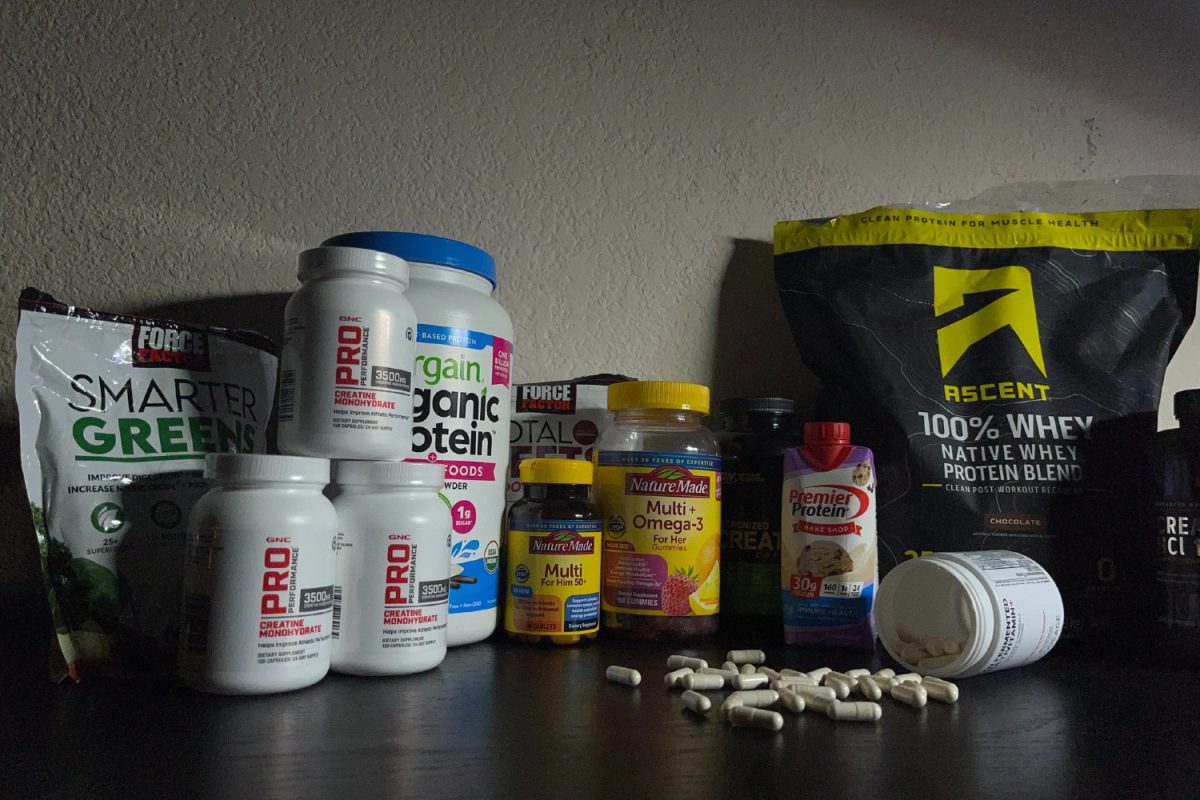Supplements like creatine, pre-workout, protein powder, Ashwagandha, and many more have risen in our social media-ridden world. For better or for worse, teenagers alike are challenged with the tough decision to take supplements.
The growing influence of social media trends, social standings between friends, and no idea what the other side of the screen intends has swayed the minds of many. Seeing huge, strong, rippling muscles on the other side of a screen can leave lasting impressions on teenagers alike.
“Do your own research, not from TikTok or Instagram. Less is more; You should acquire most of your vitamins and protein through real, healthy foods and only supplements for good measure,” said Nathan Man, a Junior at Carlmont.
According to News in Health, More than half of all Americans take one or more dietary supplements daily or occasionally.
“I have taken various supplements for three years, albeit inconsistently. I often forget and go on long breaks without,” Man said.
Even if Man’s intake of supplements is inconsistent, he certainly does not neglect supplements. Man takes fish oil, Ashwagandha, leaf and root extract, multivitamins, and caffeine. In addition, his workouts include five weekly lifts for three hours each time. Man ensures he makes the most of his time and assigns specific workouts to specific days.
“I know some of my friends have these big tubs of whey protein; they’ll have tons of it at a time. I don’t know if it helps them with any muscle building, but it makes them happy, so I’m fine with it,” said Emmett Rennich, a sophomore at Carlmont.
Rennich, new to the world of supplements but an expert in the realm of food, has recently been influenced by the influx of supplement-based food products.
“One of my friends goes to the gym a lot. Because of that, I’m pretty sure my phone is listening to my microphone because I got recommended stuff about workouts, weight lifting, protein, and meat-heavy prep meals,” Rennich said.
The impact of social media on supplement usage is apparent. When taking supplements, safety should be the top concern. Learning the proper dosages, cycles, and amounts takes time and consideration. According to the Pew Research Center, eight in 10 internet users, or about two-thirds of U.S. adults, look online for health information.
“Most of these supplements support the idea of ‘get rich quick, get thin quick, or get jacked quick.’ The allure of doing something without actually earning it is a real problem. Unfortunately, I think that is a reality in our culture today,” said Jayson Waller, a former powerlifter and fitness-minded teacher at Carlmont.
According to the National Institutes of Health (NIH), a lot is unknown about the use of supplements. Their effectiveness is not entirely disclosed to the customer. Marketers of a supplement do not have to prove to the Food and Drug Administration (FDA) that it is safe or will do exactly what is shown in the advertisements. Weight loss and muscle building, in particular, have a history of contamination by hidden prescription drugs.
“If you go deep enough into food social media, you’ll start seeing more social media posts about a new recipe you can make using whey protein—for example, whey protein brownies, a whey protein cake, or a protein milkshake. You can add whey protein to almost anything to help make your food before a workout. I’ve been seeing a lot of new companies trying to sell their food in new flavors, new ways to gain muscle, and new recipes,” Rennich said.
Advertisements targeting teenagers eager to gain muscle, fix dietary problems, and unlock healthy habits are very effective. The Federal Trade Commission (FTC) has put guidelines in place regarding endorsements and disclosures. These guidelines acknowledge the influence of influencers and the potential for misleading advertising.
“I would say that social media conveys that, ‘hey, you can do X, Y, or Z because those people did it,’ even though they’re probably cheating and lying to you. I would say there are red flags for almost everything. The risk outweighs the reward. The rewards for nearly every supplement, other than creatine, are minimalistic to such a degree that it’s useless. They’re not helpful, and they cost way too much,” Waller said.
According to the U.S. Food and Drug Administration (FDA), the most common supplements are vitamins, minerals, botanicals or herbs, botanical compounds, amino acids, and live microbials. However, the FDA makes sure to note that all supplements are drugs, even when they are labeled as just dietary supplements. Therefore, some social media advertisements will be misleading.
“When you’re an athlete, there’s a lot of pressure, but I think the best thing to do is to trust the process. The process is whatever macronutrient trifecta works for you in your particular sport. Also, it can always change. I got into powerlifting a couple of years ago, and I ate more. I had a different system than I do now. Nowadays, as an old dude, I play more soccer, so I run a lot more, so I don’t lift as heavy. Therefore, I don’t eat what I did before,” Waller said.
How can teenagers remain well-informed about supplements? Proper research is fundamental. Multiple trustworthy sources are necessary; however, the effects of supplements vary from person to person. Therefore, knowing which supplement, if any, is correct for everybody is not easy. In addition, peer pressure can cause many problems, including body dysmorphia and poor judgment. Body dysmorphia, in particular, is a topic that can heavily influence a teenager’s intake of supplements.
“I would suggest avoiding Walmart-style brands with pictures of people on steroids on the packaging. Avoid vegetarian protein; whey concentrate is good, but isolate is best,” Man said.
Teenagers are not the only ones using supplements. According to the National Center for Health Statistics (CDC), the use of dietary supplements increases with age. Still, it was highest among women aged 60 and over, with about 80.2% of them taking supplements. In addition, the most common supplements used by all age groups are multivitamin-mineral supplements, vitamin D, and omega-3 fatty acids.
“I would argue that, as an old dude, I’m 45, halfway to 90, it’s tough to look a particular way at a particular age because God is against you. The reason why I’m religious about what I eat is, one, I’m religious, and two, I recognize that there are certain things that I have to do that, frankly, someone younger than me can get away with. I have one splurge meal weekly, and the rest are incredibly clean. I have six meals per day. After 42 meals, I have only one splurge meal,” Waller said.
Discipline, knowing boundaries, and health-minded thinking are central to Waller’s muscle-building and athletic performance success. Though supplements are not inherently evil, with the improper use and neglect of safety concerns, anything can become corrupt.
“There will always be two people on each side of an argument. Social media encourages more people to try and get fit because you see many fit people on your pages. But really, there are going to be people who get fit naturally. There’s gonna be people who take creatine, and there’s gonna be people who take steroids. In the end, it’s all up to the person. If it works for them, they should go for it,” Rennich said.






















